-2024届高考英语备考复习高考长难句突破解析版++系列1(1-30)课件(共20张PPT)
文档属性
| 名称 | -2024届高考英语备考复习高考长难句突破解析版++系列1(1-30)课件(共20张PPT) | 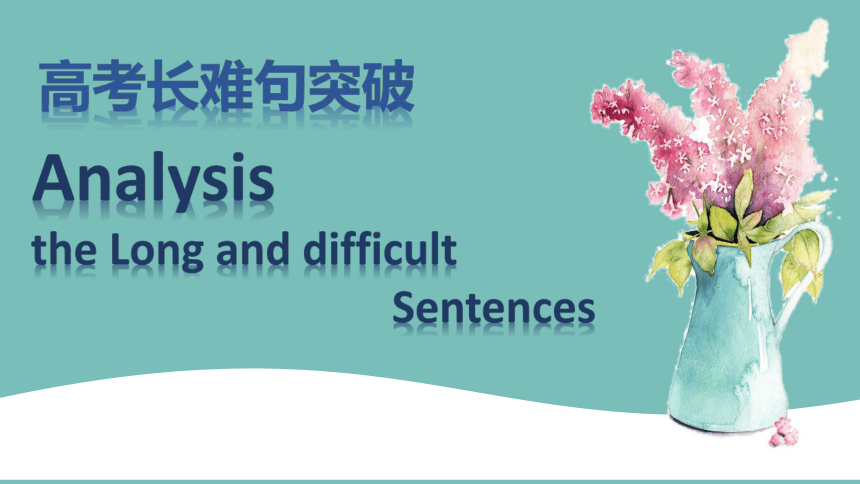 | |
| 格式 | pptx | ||
| 文件大小 | 1.2MB | ||
| 资源类型 | 教案 | ||
| 版本资源 | 通用版 | ||
| 科目 | 英语 | ||
| 更新时间 | 2023-06-10 13:44:23 | ||
图片预览


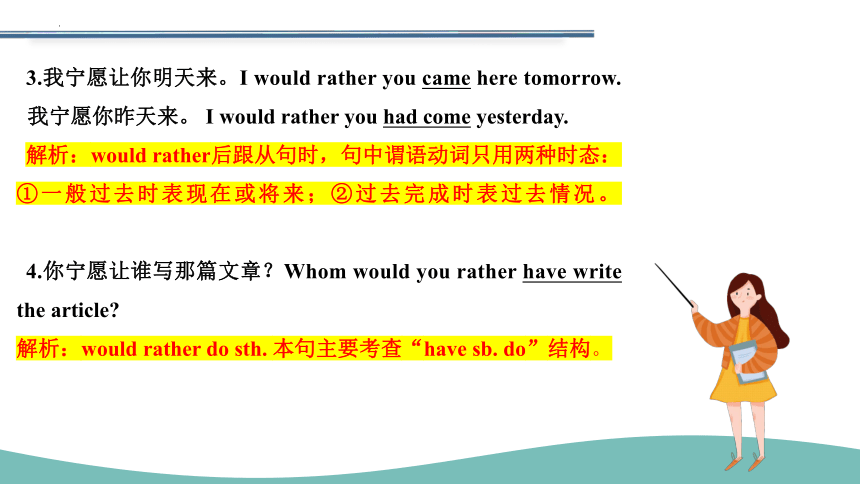

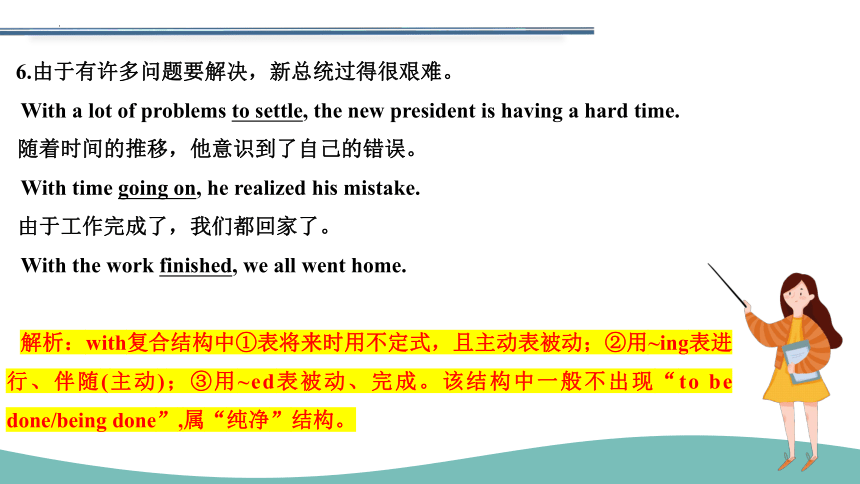
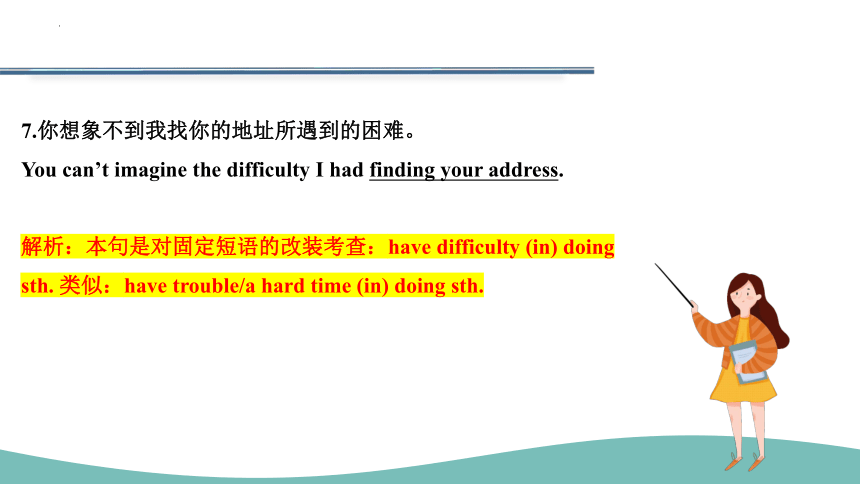

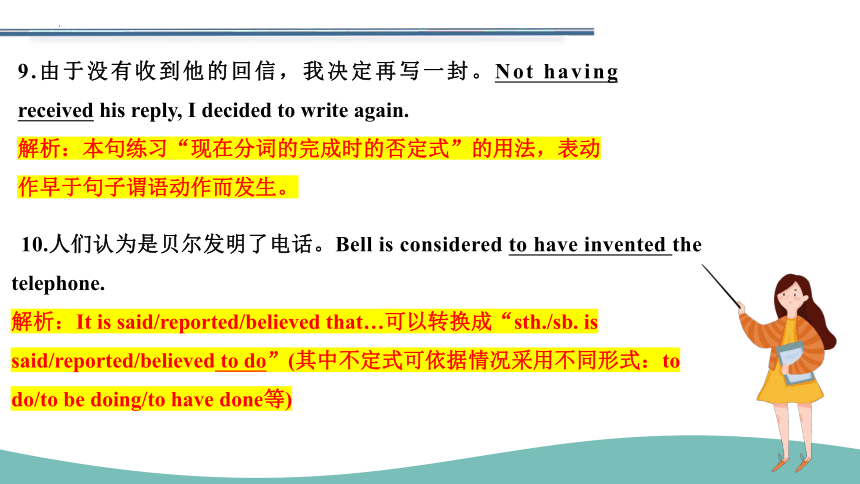
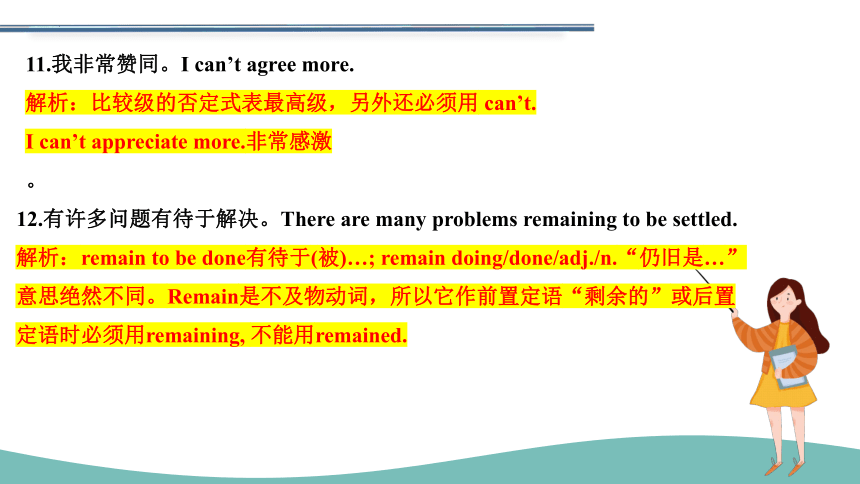
文档简介
(共20张PPT)
高考长难句突破
Analysis
the Long and difficult
Sentences
1.我该去上学了。It is (high) time I went to school. 或It is (high) time I should go to school.
解析:It’s(high) time… “是…时候了,该做…了”,其后从句中只用两种形式:主语+did/should do…
2.这是我第一次来这儿。This/It is the first time that I have been here.
解析:“是第几次做…”,从句中用完成时。如果前边是was, 其后用had done(过去完成)
3.我宁愿让你明天来。I would rather you came here tomorrow.
我宁愿你昨天来。 I would rather you had come yesterday.
解析:would rather后跟从句时,句中谓语动词只用两种时态:①一般过去时表现在或将来;②过去完成时表过去情况。
4.你宁愿让谁写那篇文章?Whom would you rather have write the article
解析:would rather do sth. 本句主要考查“have sb. do”结构。
5.虽然他是一个孩子,但懂得很多。Child as he is, he knows a lot.
解析:as引导让步状语从句时必须用倒装:①作表语的adj./n.可前提(名词前不带冠词);②作状语的副词可提前:Carefully as he drove, the accident still happened.③当谓语中含有情态动词时,主要动词可提前:Try as he might, he failed.
6.由于有许多问题要解决,新总统过得很艰难。
With a lot of problems to settle, the new president is having a hard time.
随着时间的推移,他意识到了自己的错误。
With time going on, he realized his mistake.
由于工作完成了,我们都回家了。
With the work finished, we all went home.
解析:with复合结构中①表将来时用不定式,且主动表被动;②用~ing表进行、伴随(主动);③用~ed表被动、完成。该结构中一般不出现“to be done/being done”,属“纯净”结构。
7.你想象不到我找你的地址所遇到的困难。
You can’t imagine the difficulty I had finding your address.
解析:本句是对固定短语的改装考查:have difficulty (in) doing sth. 类似:have trouble/a hard time (in) doing sth.
8.我正要外出,就在这时电话铃响了。
I was about to go out / on the point of gong out when the telephone rang.
我们正上着英语课,这时灯突然灭了。
We were having an English class when suddenly the light went out.
我们还没有走出多远,就在这时天开始下起雨来。
We hadn’t walked far when it began to rain.
解析:这三句是练习when表“意外”的三种时态:①…was about to do/on the point of doing when…; ②...was doing sth. when…; ③…hadn’t/had done…when…;
9.由于没有收到他的回信,我决定再写一封。Not having received his reply, I decided to write again.
解析:本句练习“现在分词的完成时的否定式”的用法,表动作早于句子谓语动作而发生。
10.人们认为是贝尔发明了电话。Bell is considered to have invented the telephone.
解析:It is said/reported/believed that…可以转换成“sth./sb. is said/reported/believed to do”(其中不定式可依据情况采用不同形式:to do/to be doing/to have done等)
11.我非常赞同。I can’t agree more.
解析:比较级的否定式表最高级,另外还必须用 can’t.
I can’t appreciate more.非常感激
。
12.有许多问题有待于解决。There are many problems remaining to be settled.
解析:remain to be done有待于(被)…; remain doing/done/adj./n.“仍旧是…”意思绝然不同。Remain是不及物动词,所以它作前置定语“剩余的”或后置定语时必须用remaining, 不能用remained.
13.是什么事让他那么生气?(强调句)What was it that made him so angry
解析:这是强调句的特殊疑问句,前四个词是固定的 “Wh~+is/was +it+that+句子剩余部分?”
14.珍真的不知道她的钱在什么地方被偷了。
Jane really doesn't know where it was that she had her money stolen.
解析:本句考查强调句的特殊疑问句作宾语从句时的语序问题(陈述语序)。
15.直到到了家,珍才意识到她把钥匙丢了。
It was not until she got home that Jane realized she had lost her keys.
解析:这是强调not until的句式,主句不能用倒装; only修饰状语用在句首时主句倒装,但用在强调句中时主句就不用倒装。该句也可变成倒装句Not until she got home did Jane realize she had lost her keys.
16. (现在)我希望有一辆自己的车。
I wish that I had a car of my own.
(将来)我希望有一天去上大学。
I wish that I would go to college one day.
(过去)我多希望我昨天同你一起去看电影啊!
How I wish I had gone to the cinema with you yesterday!
解析:wish后跟句子时,其谓语须用虚拟语气,且有三种时态。写作时慎用wish。
17.他对成功充满信心。He is sure of his success.
(我认为)他一定会来的。He is sure to come.
解析:sb. is sure of sth.表主语充满信心;sb. is sure to do 表说话人对主语充满信心。
18.他一定会取得重大发现的。It is certain that he will make a great discovery.
解析:It is certain that…结构中certain不能换成sure。
19.他碰巧出去了。
It (so) happened/chanced that he was out.
解析:该句式可改为:sb. happens to do…,其中不定式可依据具体情况使用不同形式。
20.他不但聪明,而且勤奋。
Not only is he clever, but also he works hard.
解析:not only…but also…连接两个句子时,前句用倒装,后句用正常语序。
21.只有用这种方法你才能算出这到题。
Only in this way can you work out the problem.
解析:only修饰状语放在句首时,主句使用部分倒装形式
(一般疑问句语序)
22.我们市南有一条铁路。
South of our city lies a railway. (方位副词放在句首时,主谓完全倒装)
解析:该句等于To the south of our city lies a railway. 表方位的on the/in the都不能省略,但to the 可以同时省略, turn to the left=turn left.
23.关键是工作能力而不是你来自哪儿。
It is the ability to do the job that matters rather than where you come from.
解析:这是一个强调句,被强调部分是主语,较长,谓语只有一个词matters(可由count替换).
24.(做某事)没必要/毫无疑问/无意义/希望/可能 (该句型用there而不用it)
There is no need/doubt/point/sense/hope/chance/possibility…
解析:no need后用to do; no doubt/hope/chance后用that从句;no point/sense后用in doing.
25.我是第一位只身一人去南极的女性。I was the first woman to travel alone to the South Pole.
解析:是第几个做…的,后置定语须使用to do,而不用doing.
26.明年要建的大楼是实验楼。
The building to be built next year will be our lab building.
现在正建的大楼是我们的办公楼。
The building being built now is our office building.
去年建的大楼用作了图书馆。
The building built last year is used as a library.
解析:作后置定语,又表被动的三种非谓语动词形式。一定要记清楚不同时态形式。
27.他没来的原因是他病了。The reason why he didn’t come is that he was ill.
解析:固定结构“The reason…is that…”,that引导表语从句,此时不能用because.
28. 我愿呆在家,不愿去看电影。
I would stay at home rather than go to the movie.
我愿呆在家,不愿去看电影。
I prefer to stay at home rather than go to the movie.
I prefer staying at home to going to the movie.
解析:would rather do…than do…=would do…rather than do…; prefer to do…rather than do…;prefer…to…
29.三小时后他回来了。It was three hours before he came back.
不久我们就会再见面的。It won’t be long before we meet again.
解析:“It +be+时段+before…”结构中be只有两种时态:
①一般过去式;
②一般将来时(也可使用情态动词)
注意:在“It is/has been+时段+since+主语+过去式”结构中时态的不同。
30.我第一次见她时,她正在摘苹果。
The first time I met her, she was picking apples.
上次我们见面时,大部分的话是我说的。
The last time we met, I did most of the talking.
解析:本句考查the first time作连词的用法;for the first time只能作状语。the moment/minute/instant也是连词。
高考长难句突破
Analysis
the Long and difficult
Sentences
1.我该去上学了。It is (high) time I went to school. 或It is (high) time I should go to school.
解析:It’s(high) time… “是…时候了,该做…了”,其后从句中只用两种形式:主语+did/should do…
2.这是我第一次来这儿。This/It is the first time that I have been here.
解析:“是第几次做…”,从句中用完成时。如果前边是was, 其后用had done(过去完成)
3.我宁愿让你明天来。I would rather you came here tomorrow.
我宁愿你昨天来。 I would rather you had come yesterday.
解析:would rather后跟从句时,句中谓语动词只用两种时态:①一般过去时表现在或将来;②过去完成时表过去情况。
4.你宁愿让谁写那篇文章?Whom would you rather have write the article
解析:would rather do sth. 本句主要考查“have sb. do”结构。
5.虽然他是一个孩子,但懂得很多。Child as he is, he knows a lot.
解析:as引导让步状语从句时必须用倒装:①作表语的adj./n.可前提(名词前不带冠词);②作状语的副词可提前:Carefully as he drove, the accident still happened.③当谓语中含有情态动词时,主要动词可提前:Try as he might, he failed.
6.由于有许多问题要解决,新总统过得很艰难。
With a lot of problems to settle, the new president is having a hard time.
随着时间的推移,他意识到了自己的错误。
With time going on, he realized his mistake.
由于工作完成了,我们都回家了。
With the work finished, we all went home.
解析:with复合结构中①表将来时用不定式,且主动表被动;②用~ing表进行、伴随(主动);③用~ed表被动、完成。该结构中一般不出现“to be done/being done”,属“纯净”结构。
7.你想象不到我找你的地址所遇到的困难。
You can’t imagine the difficulty I had finding your address.
解析:本句是对固定短语的改装考查:have difficulty (in) doing sth. 类似:have trouble/a hard time (in) doing sth.
8.我正要外出,就在这时电话铃响了。
I was about to go out / on the point of gong out when the telephone rang.
我们正上着英语课,这时灯突然灭了。
We were having an English class when suddenly the light went out.
我们还没有走出多远,就在这时天开始下起雨来。
We hadn’t walked far when it began to rain.
解析:这三句是练习when表“意外”的三种时态:①…was about to do/on the point of doing when…; ②...was doing sth. when…; ③…hadn’t/had done…when…;
9.由于没有收到他的回信,我决定再写一封。Not having received his reply, I decided to write again.
解析:本句练习“现在分词的完成时的否定式”的用法,表动作早于句子谓语动作而发生。
10.人们认为是贝尔发明了电话。Bell is considered to have invented the telephone.
解析:It is said/reported/believed that…可以转换成“sth./sb. is said/reported/believed to do”(其中不定式可依据情况采用不同形式:to do/to be doing/to have done等)
11.我非常赞同。I can’t agree more.
解析:比较级的否定式表最高级,另外还必须用 can’t.
I can’t appreciate more.非常感激
。
12.有许多问题有待于解决。There are many problems remaining to be settled.
解析:remain to be done有待于(被)…; remain doing/done/adj./n.“仍旧是…”意思绝然不同。Remain是不及物动词,所以它作前置定语“剩余的”或后置定语时必须用remaining, 不能用remained.
13.是什么事让他那么生气?(强调句)What was it that made him so angry
解析:这是强调句的特殊疑问句,前四个词是固定的 “Wh~+is/was +it+that+句子剩余部分?”
14.珍真的不知道她的钱在什么地方被偷了。
Jane really doesn't know where it was that she had her money stolen.
解析:本句考查强调句的特殊疑问句作宾语从句时的语序问题(陈述语序)。
15.直到到了家,珍才意识到她把钥匙丢了。
It was not until she got home that Jane realized she had lost her keys.
解析:这是强调not until的句式,主句不能用倒装; only修饰状语用在句首时主句倒装,但用在强调句中时主句就不用倒装。该句也可变成倒装句Not until she got home did Jane realize she had lost her keys.
16. (现在)我希望有一辆自己的车。
I wish that I had a car of my own.
(将来)我希望有一天去上大学。
I wish that I would go to college one day.
(过去)我多希望我昨天同你一起去看电影啊!
How I wish I had gone to the cinema with you yesterday!
解析:wish后跟句子时,其谓语须用虚拟语气,且有三种时态。写作时慎用wish。
17.他对成功充满信心。He is sure of his success.
(我认为)他一定会来的。He is sure to come.
解析:sb. is sure of sth.表主语充满信心;sb. is sure to do 表说话人对主语充满信心。
18.他一定会取得重大发现的。It is certain that he will make a great discovery.
解析:It is certain that…结构中certain不能换成sure。
19.他碰巧出去了。
It (so) happened/chanced that he was out.
解析:该句式可改为:sb. happens to do…,其中不定式可依据具体情况使用不同形式。
20.他不但聪明,而且勤奋。
Not only is he clever, but also he works hard.
解析:not only…but also…连接两个句子时,前句用倒装,后句用正常语序。
21.只有用这种方法你才能算出这到题。
Only in this way can you work out the problem.
解析:only修饰状语放在句首时,主句使用部分倒装形式
(一般疑问句语序)
22.我们市南有一条铁路。
South of our city lies a railway. (方位副词放在句首时,主谓完全倒装)
解析:该句等于To the south of our city lies a railway. 表方位的on the/in the都不能省略,但to the 可以同时省略, turn to the left=turn left.
23.关键是工作能力而不是你来自哪儿。
It is the ability to do the job that matters rather than where you come from.
解析:这是一个强调句,被强调部分是主语,较长,谓语只有一个词matters(可由count替换).
24.(做某事)没必要/毫无疑问/无意义/希望/可能 (该句型用there而不用it)
There is no need/doubt/point/sense/hope/chance/possibility…
解析:no need后用to do; no doubt/hope/chance后用that从句;no point/sense后用in doing.
25.我是第一位只身一人去南极的女性。I was the first woman to travel alone to the South Pole.
解析:是第几个做…的,后置定语须使用to do,而不用doing.
26.明年要建的大楼是实验楼。
The building to be built next year will be our lab building.
现在正建的大楼是我们的办公楼。
The building being built now is our office building.
去年建的大楼用作了图书馆。
The building built last year is used as a library.
解析:作后置定语,又表被动的三种非谓语动词形式。一定要记清楚不同时态形式。
27.他没来的原因是他病了。The reason why he didn’t come is that he was ill.
解析:固定结构“The reason…is that…”,that引导表语从句,此时不能用because.
28. 我愿呆在家,不愿去看电影。
I would stay at home rather than go to the movie.
我愿呆在家,不愿去看电影。
I prefer to stay at home rather than go to the movie.
I prefer staying at home to going to the movie.
解析:would rather do…than do…=would do…rather than do…; prefer to do…rather than do…;prefer…to…
29.三小时后他回来了。It was three hours before he came back.
不久我们就会再见面的。It won’t be long before we meet again.
解析:“It +be+时段+before…”结构中be只有两种时态:
①一般过去式;
②一般将来时(也可使用情态动词)
注意:在“It is/has been+时段+since+主语+过去式”结构中时态的不同。
30.我第一次见她时,她正在摘苹果。
The first time I met her, she was picking apples.
上次我们见面时,大部分的话是我说的。
The last time we met, I did most of the talking.
解析:本句考查the first time作连词的用法;for the first time只能作状语。the moment/minute/instant也是连词。
